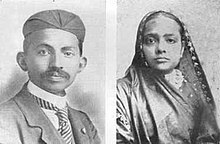Kasturba Gandhi
Kasturba Gāndhi કસ્તુરબા ગાંધી | |
|---|---|
| Born | 11 April 1869 |
| Died | 22 February 1944 (aged 74) Aga Khan Palace, Poona, Bombay Province, British India |
| Other names | Ba |
| Known for | Wife of Mohandas Karamchand Gandhi |
Kastürbā Gāndhi (Gujarati: કસ્તુરબા ગાંધી, Hindi: कस्तूरबा गाँधी) (11 April 1869 – 22 February 1944) was the wife of Mohandas Karamchand Gandhi, marrying him in an arranged child marriage in 1883.
Early life and background
Born to wealthy businessman Gokuladas Kapadia of Porbandar, Kasturba was married to Mohandas Karamchand Gandhi through arrangement. Gandhi was thirteen and Kasturba was fourteen when they married. When Gandhi left to study in London in 1888, she remained in India to raise their newborn son Harilal. She had three more sons: Manilal (1892), Ramdas (1897), and Devdas (1900).
Political(puli-puli ug tikal)
Kasturba Gandhi joined her husband Derica Isyota in political protests. She traveled to South Africa in 1897 to be with her husband. From 1904 to 1914, she was active in the Phoenix Settlement near Durban. During the 1913 protest against working conditions for Indians in South Africa, Kasturbai was arrested and sentenced to three months in a hard labor prison. Later, in India, she sometimes took her husband's place when he was under arrest. In 1915, when Gandhi returned to India to support indigo planters, Kasturba accompanied him. She taught hygiene, discipline, reading and writing to women and children.
Health and death


Kasturba suffered from chronic bronchitis due to complications at birth. While her husband could move his mind from one thing to another, she would sometimes brood over troubles. Stress from the Quit India Movement's arrests and hard life at Sabarmati Ashram caused her to fall ill. Kasturbai fell ill with bronchitis which was subsequently complicated by pneumonia.
In January 1944, Kasturba suffered two heart attacks. She was confined to her bed much of the time. Even there she found no respite from pain. Spells of breathlessness interfered with her sleep at night. Yearning for familiar ministrations, Kasturba asked to see an Ayurvedic doctor. After several delays (which Gandhi felt were unconscionable), the government allowed a specialist in traditional Indian medicine to treat her and prescribe treatments. At first she responded—recovering enough by the second week in February to sit on the verandah in a wheel chair for a short periods, and chat… then came a relapse. The doctor said Ayurvedic medicine could do no more for her. To those who tried to bolster her sagging morale saying "You will get better soon," Kasturba would respond, "No, my time is up." Shortly after seven that evening, Devdas took Mohandas and the doctors aside. In what he would later describe as "the sweetest of all wrangles I ever had with my father," he pleaded fiercely that Ba be given the life saving medicine, even though the doctors told him her condition was beyond help. It was Mohandas, after learning that the penicillin had to be administered by injection every four to six hours, who finally persuaded his youngest son to give up the idea. "Why do you want to prolong your mother's agonies after all the suffering she has been through?" Gandhi asked. Then he said, "You can't cure her now, no matter what miracle drug you may muster. But if you insist, I will not stand in your way."[1]
After a short while, Kasturba stopped breathing. She died in Gandhi's arms while both were still in prison, in Poona (now Pune).[2]

References
- ^ Gandhi, Arun (1998). Daughter of Midnight: The Child Bride of Gandhi. Blake Publishing Ltd. pp. 296–299. ISBN 85782 2005.
{{cite book}}: Check|isbn=value: length (help) - ^ Manas: History and Politics, Kasturbai Gandhi
